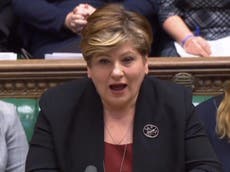Donald Tusk is a friend to Britain and our MPs should take heed
There is no creative solution that can make two plus two equal five; and nor is there one that can eliminate a border between two customs regimes – to devise one would be beyond even Alan Turing
Donald Tusk, as president of the European Council – an essentially political body representing the EU’s member states – is quite entitled to use the sort of frank language he did when he remarked that there will be a “special place in hell” for politicians who promoted Brexit “without even a sketch of a plan”.
Contrary to how some of the Brexiteers have reacted, Mr Tusk makes such remarks not because he is anti-British but because he is a friend of Britain, and does not wish to see the nation suffer by leaving the EU.
Throughout the Brexit process, Mr Tusk has often been emotional about the result of the 2016 referendum; and made little secret of his hope that Britain would, after all, stay in.
He is, though, realistic enough to recognise a unicorn when he meets one, and he can be in no doubt that Theresa May’s proposal to renegotiate the UK-EU withdrawal agreement is impossible.
This is not a matter of EU pride, spite or intransigence; it is simply that no one has yet been able to suggest a suitable alternative to the Irish backstop. All the ideas currently being canvassed about behind-the-border checks, technology and the rest have been aired and rejected many months ago.
German chancellor Angela Merkel may have sent signals that she is open to creative solutions, but there is no creative solution that can make two plus two equal five; and nor is there one that can eliminate a border between two customs regimes. To devise one would be beyond even Alan Turing.
So we are going round in circles.
Meanwhile, jobs are being lost, investment catastrophically depressed and the prospect of a deep and protracted post-Brexit recession grows, especially if there is a no-deal withdrawal.
There is some common sense around. Standing in for Jeremy Corbyn at prime minister’s questions, the shadow foreign secretary, Emily Thornberry, made her usual level-headed appeal to the government to pause Article 50 for the obvious reason that parliament has already run out of time to get any kind of deal agreed and implemented (or, indeed, to make the preparations that would be required for no deal).
As ever – though rather more smoothly than the prime minister – David Lidington turned down the idea on behalf of the government. Who needs more time?
In reality, next week presents another opportunity for the Commons to take back control and rule out no deal. It might yet do so.
The margin of defeat for the amendment to that effect a few weeks ago by backbenchers Yvette Cooper (Labour) and Nick Boles (Conservative) was relatively narrow. The pressure inside cabinet for the prime minister to ease off her strategy of running the clock down must be getting intense.
If Philip Hammond, Amber Rudd, Greg Clark and David Gauke are not yet prepared to use their muscle to force a decision, then soon it may be too late for them to do so.
Meanwhile, Labour’s decision to take a more aggressive stance on delaying Article 50 and ruling out a no-deal Brexit has arrived late – but it could still provide fresh impetus for the move.
What is really required is for Mr Corbyn to exercise the same sort of discipline on his pro-Brexit, pro-May rebels as he has in the past on those of his colleagues who are Remainers. Why are the abstainers still in his shadow cabinet?
As has been the case for some time, the ball is at Mr Corbyn’s feet, and the goal is open.
So, tomorrow Ms May flies once again to Brussels to meet Jean-Claude Juncker, president of the European Commission, and his team: another triumph of hope over experience. Her officials and the commission have already been engaged with one another, privately and publicly. Some form of words, perhaps with “legal” status, will be concocted. Again, though, it will not be sufficient to appease her rebels – they have already said as much.
We will therefore next week have another meaningless meaningful vote in which the prime minister’s policy is voted down, and she appeals again for loyalty, and asks again for talks with the opposition. Do we have to go through all of this again in March?
Or will Mr Tusk or Mr Juncker do the kindest thing and advise Ms May that it’s not worth the aviation fuel just to go to Belgium and be handed another “non”?
The big, optimistic picture is this. There are only about 100 MPs, mostly from the Tory and DUP representation in the Commons, who would countenance a no-deal Brexit. Everyone else fears and loathes it. There is a latent majority in the Commons of about 450 in favour of ruling out the option.
Sooner or later that voice will be heard. The Spelman amendment a few weeks ago started that process of asserting the will of the Commons, with a non-binding expression of resistance to no deal. That will grow louder and more insistent, if not next week, then soon after.
If not, through some misadventure or miscalculation, then, as Mr Tusk says, there will indeed be a special place for those MPs whose brains remain unconnected to their backbones.




Join our commenting forum
Join thought-provoking conversations, follow other Independent readers and see their replies